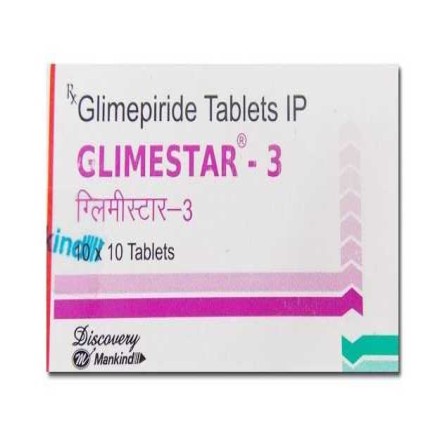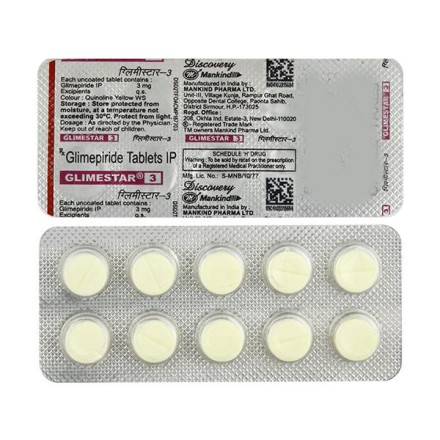All Details About Glimestar 3 Tablet
Find out detailed description, uses, directions of use, side effects, warnings and precautions, frequently asked questions about Glimestar 3 Tablet
Description:
Glimestar 3 Tablet belongs to a group of medicines called sulfonylureas and is used to treat type 2 diabetes mellitus in adults. It helps control blood sugar levels in people with diabetes thereby preventing serious complications of diabetes such as kidney damage and blindness.
Glimestar 3 Tablet may be used alone or along with other medicines. It should be taken just before or with the first meal of the day. Take it regularly at the same time each day to get the maximum benefit. Your doctor will decide what dose is best for you and this may change from time to time according to your blood sugar levels.
Keep taking Glimestar 3 Tablet, even if you feel well or your blood sugar levels are controlled. If you stop it without consulting your doctor, your blood sugar levels could rise to put you at risk of diabetes complications such as kidney damage, blindness, nerve problems, and loss of limbs. Remember that it is only part of a treatment program that should also include a healthy diet, regular exercise, and weight reduction as advised by your doctor. Your lifestyle plays a big part in controlling diabetes.
Uses:
Take this medicine in the dose and duration as advised by your doctor. Swallow it as a whole. Do not chew, crush or break it. Glimestar 3 Tablet is to be taken with food.
Directions For Use:
- Take Glimestar 3 Tablet shortly before or with the first main meal of the day (usually breakfast).
- Exercise regularly, eat a healthy diet and take your other diabetes medicines (if prescribed) alongside.
- Monitor your blood sugar level regularly while you are taking Glimestar 3 Tablet.
- Glimestar 3 Tablet can cause hypoglycemia (low blood sugar level) when used with other antidiabetic medicines, alcohol or if you delay or miss a meal.
- Be careful while driving or operating machinery until you know how Glimestar 3 Tablet affects you.
- Always carry some sugary food or fruit juice with you in case you experience hypoglycemic symptoms such as cold sweats, cool pale skin, tremor and anxiety.
- Your doctor may check your liver function regularly. Inform your doctor if you develop symptoms, such as abdominal pain, loss of appetite, or yellowing of the eyes or skin (jaundice).
Side Effects:
Most side effects do not require any medical attention and disappear as your body adjusts to the medicine. Consult your doctor if they persist or if you’re worried about them
Common side effects of Glimestar
- Hypoglycemia (low blood glucose level)
- Headache
- Nausea
- Dizziness
Warning & Precautions:
Before taking this medicine, tell your doctor if you have ever had heart disease, thyroid disease, or some hormonal conditions, as it may not be suitable. Pregnant or breastfeeding women should also consult their doctor before taking it. Your blood sugar levels should be checked regularly and your doctor may also advise blood tests to monitor your blood cell counts and liver function.
FAQs:
Q. What is the dosage of Glimestar 3 Tablet?
A: The recommended starting dose of Glimestar 3 Tablet is 1 mg or 2 mg once daily, administered with breakfast. If you are at a higher risk of low blood sugar (e.g., the elderly or patients with renal impairment), you will be given a starting dose of 1 mg once daily. The usual maintenance dose is 1–4 mg once daily. The maximum recommended dose is 8 mg once daily. After reaching a daily dose of 2 mg, the dosage will be increased not more than 2 mg at 1- to 2-week intervals, based on your blood glucose level.
Q. Does Glimestar 3 Tablet make you sleepy?
A: Glimestar 3 Tablet itself does not cause sleepiness. However, it may cause hypoglycemia (low blood sugar) when used with other anti-diabetes medicine. Because of this you may feel sleepy or have problems in sleeping.
Q. Is Glimestar 3 Tablet safe for kidneys?
A: Glimestar 3 Tablet does not affect kidneys in patients with normal kidney function. However, its use should be avoided in patients with severe kidney disease since Glimestar 3 Tablet is principally eliminated by the kidneys.
Disclaimer:
Getomeds primary intention is to ensure that its consumers get information that is reviewed by experts, accurate, and trustworthy. The information and contents of this website are for informational purposes only. They are not intended to be a substitute for professional medical advice, diagnosis, or treatment. Please seek the advice of your doctor and discuss all of your concerns about any disease or medication. Do not disregard or postpone seeking professional medical advice because of something you read on Getomeds. Our mission is to support, not replace, the doctor-patient relationship.

